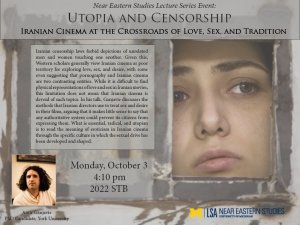Presented By: Department of Middle East Studies
Near Eastern Studies Lecture Series
Amir Ganjavie (York University) - Utopia and Censorship: Iranian Cinema at the Crossroads of Love, Sex, and Tradition

Iranian censorship forbids depictions of unrelated men and women touching one another. Given this, Western scholars generally view Iranian cinema as poor territory for exploring love, sex, and desire, with some even suggesting that pornography and Iranian cinema are two contrasting entities. Granted, it is difficult to find a direct representation of love and sex in Iranian movies but this limitation does not mean that Iranian cinema is devoid of such topics. In fact, as Hamid Naficy and Shahla Haeri both argue, Iranian directors have proposed very sophisticated, complex, and ingenious methods for discussing eroticism, love, and passion in their movies. When faced with strict censorship and social and moral barriers, what methods have Iranian directors developed in order to address love, desire, and passion? In what ways do these methods emancipate or emasculate Iranian artists in their quest to express love and eroticism? Ganjavie attempts to answer these questions, arguing that it makes little sense to say that any authoritative system with a system of hegemony could prevent its citizens from expressing this impulse in their works since the sexual instinct is life’s drive and only at the moment of death can humans deny its existence. What is essential, radical, and utopian is to read the meaning of eroticism in Iranian cinema through the specific culture in which the drive has been developed and shaped.
Amir Ganjavie, a PhD student in communication and culture at York University, is a Toronto-based writer, cultural citric, and festival director. Fascinated by the issue of alternative and utopian space in modern urban settings, Ganjavie has published several articles and two books, one on utopia (Le rôle de la pensée utopique dans l’aménagement des villes de demain) and the other on walkable neighborhoods (Pour une ville qui marche). Aside from academic life, he writes for Filmint, Mubi, Senses of Cinema, Offscreen, and Brightlight and also works as the CEO of Cine-Iran festival, an annual festival of contemporary Iranian cinema held in Toronto, Canada. He has recently co-edited a special volume on alternative Iranian cinema for film International and edited Humanities of the Other, an essay collection on the Dardanne Brothers. He is now working on a special issue on Iranian cinema and eroticism for Asian Cinema journal.
Amir Ganjavie, a PhD student in communication and culture at York University, is a Toronto-based writer, cultural citric, and festival director. Fascinated by the issue of alternative and utopian space in modern urban settings, Ganjavie has published several articles and two books, one on utopia (Le rôle de la pensée utopique dans l’aménagement des villes de demain) and the other on walkable neighborhoods (Pour une ville qui marche). Aside from academic life, he writes for Filmint, Mubi, Senses of Cinema, Offscreen, and Brightlight and also works as the CEO of Cine-Iran festival, an annual festival of contemporary Iranian cinema held in Toronto, Canada. He has recently co-edited a special volume on alternative Iranian cinema for film International and edited Humanities of the Other, an essay collection on the Dardanne Brothers. He is now working on a special issue on Iranian cinema and eroticism for Asian Cinema journal.